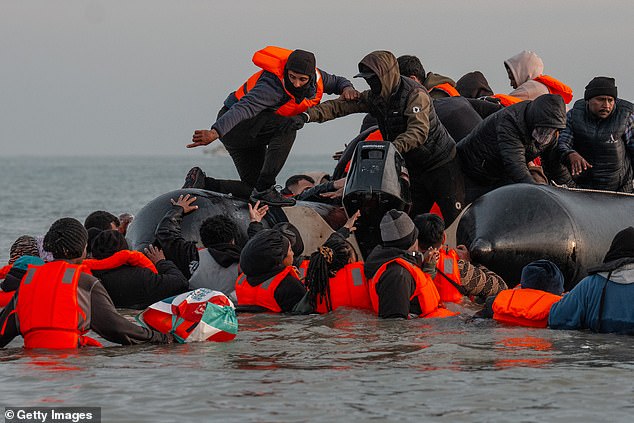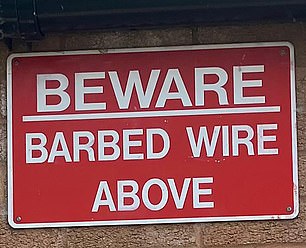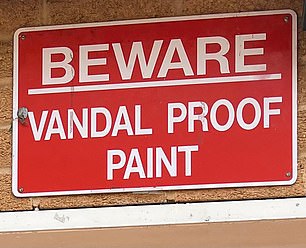If the British Government were a person, it would long ago have been sectioned and placed in a locked ward because of its severe delusions of grandeur.
It is like a man who rushes into the street and picks fights with large strangers for no reason, or a man who offers to buy a generous round in the pub and turns out to have no money, just a few American nickels and a piece of string in his dusty pocket.
When kindly people persuade this hopeless case to go home, and accompany him there to make sure he arrives safely, they find a crumbling, sordid hovel, stinking of marijuana, with a hallway piled with unpaid bills and empty bottles and the rooms all full of squatters from Africa and the Middle East, who laugh at him.
Last week, our Government’s desire for futile violence against total strangers – and its wild generosity with money it does not have – met in the promise to make this country ready for war. War with whom and about what? We have no territorial quarrel with any country. In any case, nobody in modern Britain is remotely ready for war.

‘Last week, our Government’s desire for futile violence against total strangers – and its wild generosity with money it does not have – met in the promise to make this country ready for war,’ writes Peter Hitchens. Pictured: Prime Minister Sir Keir Starmer
Soft and subsidised as we are, increasingly kept content by being diagnosed with imaginary mental complaints – and then drugged – we would be reduced to a state of freezing shock by actual war.
I don’t mean bombs falling from the sky, though these might come. I mean the suddenly empty shelves in the shops, the day-long queues for petrol, the disappearance of vital medicines, the confiscatory taxation, the power cuts, the billeting, the conscription, the delirious inflation and suppression of almost every freedom worth having, from speech to travel. I promise you, you won’t have time to have ADHD if war ever comes.
One familiar thing would continue – the soft waves of mysterious young men arriving almost daily on the beaches of Kent and Sussex. I doubt even a nuclear war will stop this now. About these, our leaders can do nothing and know it. Though if we had been less keen on war, they’d never have come here. We could build 50 submarines and become the world leader in drones and still they would arrive.
We created this immense immigration by starting vain conflicts in Iraq, Syria and Libya. Now we are likely to increase it before too long with even more moronic wars in Russia and Iran. For those who struggle from the Bosphorus to the Channel, or across the Mediterranean, Britain will still be preferable to the deserts and ruins our wars have made in their homelands.
The problem about delusions of grandeur is that they tend to infect people who used to be powerful. But our power only worked in a very different world – one that we dominated by wealth and naval strength.
We threw those away.
But we still act as if we were big, when we are small. If we didn’t try to pretend we were a superpower, and concentrated on being as wealthy and strong as we could afford to be, we’d be treated with more respect.

‘We created this immense immigration by starting vain conflicts in Iraq, Syria and Libya,’ writes Peter Hitchens. Pictured: Migrants try to board a Dinghy in Gravelines, France, last month
The Blairites, of course, did not want us to be strong or independent, and so were happy to entangle us in the EU and human rights web. Under them we also imagined that tagging along behind the USA made us important, when it made us look ridiculous – like a little rowing boat, flying an enormous Union Jack, bouncing in the wake of some vast US Navy aircraft carrier.
I told you so. I will keep telling you so.
The decade of decay and debauchery

Julie Christie, who plays a young woman lost in the debauched world of the London chattering classes, in 1965 film Darling
Almost every day I am falsely accused of longing for a return to the 1950s, a grim period of failure and decline.
By the time the true 1960s began, in about 1966, this country was already thoroughly demoralised in almost every way you can think of and some you can’t.
That decay had got under way in the supposedly cosy 1950s. Evidence for this comes in a revival of the sordid 1965 film Darling, which starred the beautiful Julie Christie as a young woman lost in the debauched world of the London chattering classes.
In an age some think of as prim and buttoned up, Ms Christie’s character, a model called Diana Scott, leaps from bed to adulterous bed, suffers an abortion and makes an appalling scene in the London Underground when she is accused of being a prostitute.
I don’t recommend it, but I well recall that 1965 London, especially the hideous atheist concrete and glass buildings with beautiful views of the imperial and Christian grandeur they elbowed aside.


Strolling through a seemingly well-maintained housing estate on a sunny afternoon, I saw these two signs in bloody red, fixed to a ‘community centre’. In my experience such notices are memorials to bad events, as well as warnings of more to come. Spend as much as you like on good material surroundings, if you let strong families fall apart and stop police foot patrols, a sort of hell will follow.
A small victory against e-scooters
A memorial should be erected to Basildon Council in Essex which, in the face of fashion and complacency, expelled e-scooters from its territory. Elsewhere, many councils repeatedly renew so-called ‘experiments’ in which these dangerous, nasty vehicles are legally permitted.
The effect of this (was it intended?) has been to destroy the former law which banned electric motorbikes. Fast, heavy motor vehicles can now in practice be freely driven without licence plates, by people who have never passed a test.
These now charge about everywhere, frightening and injuring the rest of us. The consequences are huge for road safety, yet Parliament is silent.












